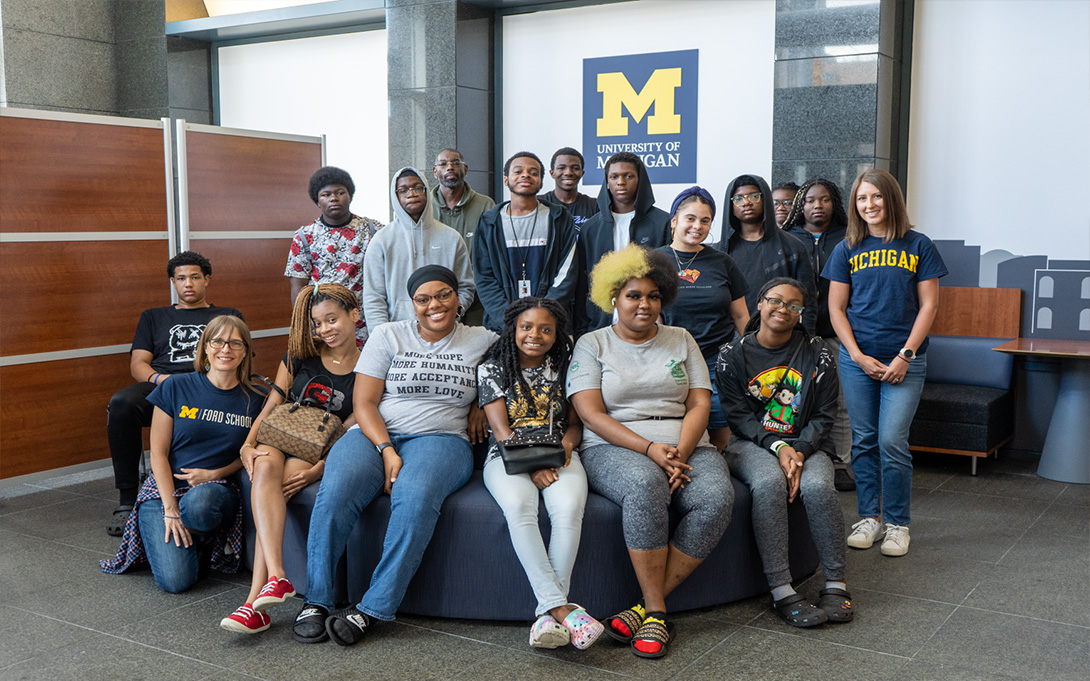
Imagine, summer vacation is coming to an end and you must start school next week, but you haven’t been able to shower in a week. Would you be able to focus on school?
That was the question posed by a group of teens and young adults advocating for services to meet people’s basic needs as part of the Detroit Phoenix Center’s Summer Leadership Academy. The six-week program supported 30 youth in identifying areas where they wanted to lead change in their communities and coming up with a plan to get started. The young leaders identified mental health, basic needs, and the criminal legal system as the most pressing issues impacting youth in their communities.
"Who is anyone to say that someone doesn't deserve to have basic needs in life, like access to taking showers, having a place to lay their head at night, or just food and water?" said Tayauana Holloway, one of the young adults who worked on the basic needs service-learning project.
Through the Summer Leadership Academy, youth scripted and appeared in social media videos promoting a new app that connects youth with essential services, and they wrote personal narratives and advocacy statements related to their service-learning projects. For their service-learning projects, they hosted a mental health awareness event open to the community, distributed basic needs kits, and attended virtual court proceedings to learn more about the criminal legal system.
“It has been a sprint. They worked really hard, and they’re really excited,” said Courtney Smith, founder and CEO of the Detroit Phoenix Center, at a public showcase event held Aug. 11 at the University of Michigan's Detroit Center to highlight the culmination of the young leaders’ work.
Celebrating its five-year anniversary, the Detroit Phoenix Center is a nonprofit that provides critical resources, wraparound support, and a safe, nurturing environment to youth who are transitioning out of homelessness and poverty in Detroit. The Summer Leadership Academy is supported by Grow Detroit’s Young Talent summer job program, University of Michigan, Ally, Foot Locker Foundation, McGregor Fund, and Community Foundation for Southeastern Michigan.
U-M’s Poverty Solutions initiative collaborated with the Detroit Phoenix Center to develop a series of communications workshops for the Summer Leadership Academy on owning your narrative, defining your point of view, using data to support your point, and crafting advocacy statements.
"This was an exciting opportunity to use the university’s platform to share the perspectives of youth working hard to make a difference in their communities. To truly prevent and alleviate poverty, we need policies informed by a diverse set of voices. Youth are a critical group too often left out of policy-making conversations, and this project aimed to change that,” said Lauren Slagter, senior communications specialist at Poverty Solutions.
Slagter and Jennifer Erb-Downward, senior research associate at Poverty Solutions who studies child and family homelessness, led the Summer Leadership Academy communications workshops.
Youth put their communication skills into action in on-camera interviews on what giving back to the community looks like to them, and they wrote poems that explored their personal identities and how issues they care about impact their community. They also worked in groups to develop advocacy statements on the topics of their service-learning projects.
The Summer Leadership Academy’s young leaders also learned about financial literacy, entrepreneurship and Detroit’s Black business community, mental health and wellness, and college and career readiness, with visits to U-M’s Ann Arbor campus and Eastern Michigan University. The summer program aims to build on youths' strengths as they prepare to take on leadership and activism roles.
“It is no secret that some of the young people that are here today have been directly impacted by some of the issues they are championing,” Smith said. “But we decided not to lead with that for the Summer Leadership Academy. We decided to lead with asset-framing and giving back to our community, because that is what’s important to them.”
This article was written by Poverty Solutions.

